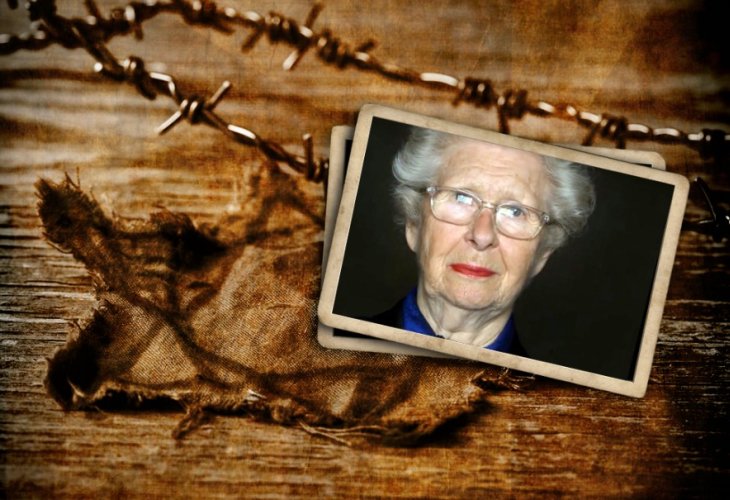The Holocaust
Francine Christophe and the Chocolate Miracle: A Holocaust Story of Kindness and Divine Providence
How an eight-year-old girl’s selfless act in Bergen-Belsen saved a mother and baby — and led to an unforgettable reunion decades later
 Francine Christophe
Francine Christophe“My name is Francine Christophe,” begins the Holocaust survivor who endured the horrors of Bergen-Belsen. “I was born on August 18, 1933 — the same year Hitler came to power.”
She holds up a small yellow star. “Look,” she says softly, “this is my star. I had to wear it on my chest, like all the Jews. It’s big, isn’t it? Especially for the little girl I was — eight years old.”
So begins one of the most moving stories of divine providence and human kindness to emerge from the Holocaust — a story of a child’s faith, a mother’s compassion, and a miracle that spanned decades.
A Piece of Chocolate in Bergen-Belsen
“When I was in Bergen-Belsen, something astonishing happened,” Francine recalls. “As children imprisoned during the war, we were given a small privilege — we were allowed to bring one small bag from France with two or three little things inside.”
“One woman brought chocolate, another brought some sugar, a third a handful of rice… My mother packed for me two small pieces of chocolate and told me, ‘We’ll keep them for the day when I see you’re completely collapsing — when you truly need help. Then I’ll give you the chocolate, and it will make you feel better.’”
Among the prisoners with them was Hélène, a friend of Francine’s mother — a frail woman who happened to be pregnant, though no one could tell because she was so thin.
Months passed in unbearable suffering until the time came for Hélène to give birth.
“She went to the camp hospital with my mother, who was the block leader,” Francine recounts. “Before they left, my mother came to me and asked, ‘Do you remember the chocolate I kept for you?’”
“Yes, Mama,” I said.
“How do you feel?”
“I’m okay, Mama. I’ll be fine,” I answered.
“Well,” my mother said gently, “if it’s alright with you, I would like to give your chocolate to our friend Hélène. The birth will be very hard, and she may die. But if I give her the chocolate, it might help her.”
Francine nodded her agreement.
“Hélène gave birth to a baby — a tiny, weak little thing,” she recalls. “She ate the chocolate, and she did not die. She came back to our block alive.”
The Baby Who Never Cried
Then Francine describes something almost supernatural: “The baby never cried. Not once. Never! She didn’t make even the slightest sound.”
Six months later, the camp was liberated — a miracle in itself. But the greater miracle came at that very moment, when the prisoners unwrapped the baby from her ragged cloths. “At that moment — the baby screamed!” Francine says, her eyes filling with tears even decades later. “Even as a child, I understood that something extraordinary had happened. That was the moment she was truly born!”
Francine and her mother returned to France with the baby — a fragile, malnourished little thing that looked nothing like a six-month-old.
A Lecture — and an Unbelievable Reunion
Years later, Francine’s daughter asked her: “Mom, if deportees had had psychologists or psychiatrists to help them when they returned, would it have been easier for them to cope?”
Francine answered, “Without a doubt, yes — but we didn’t have that. No one thought about psychological trauma then. But you’ve given me a wonderful idea — let’s organize a lecture about it.”
So she did. The lecture was titled: “If Concentration Camp Survivors Had Received Counseling in 1945 — What Might Have Happened?”
The event drew a diverse audience of elderly survivors, historians, and many psychologists, psychiatrists, and therapists. “It was fascinating,” Francine recalls. “Many ideas were shared. It was wonderful.”
Then, in the middle of the lecture, something miraculous happened.
A woman in the audience asked to speak. She walked up to the stage and introduced herself: “I live in Marseille, and I work there as a psychologist,” she said with emotion. “Before I share my perspective on the topic, I would like to give something to Francine Christophe.”
The crowd fell silent, watching. “She reached into her pocket,” Francine recounts, her voice trembling, “and took out a piece of chocolate. She handed it to me and said: ‘I am that baby.’”
A Miracle Remembered
A tiny act of compassion — a child’s selfless decision to give away her two pieces of chocolate, had saved a life in Bergen-Belsen. Decades later, that same baby, now a grown woman and a psychologist helping others heal, returned the chocolate to the woman who had once given it away.
A full circle of kindness, faith, and divine providence — proof that even in the darkest places, a small piece of sweetness can light the world.

